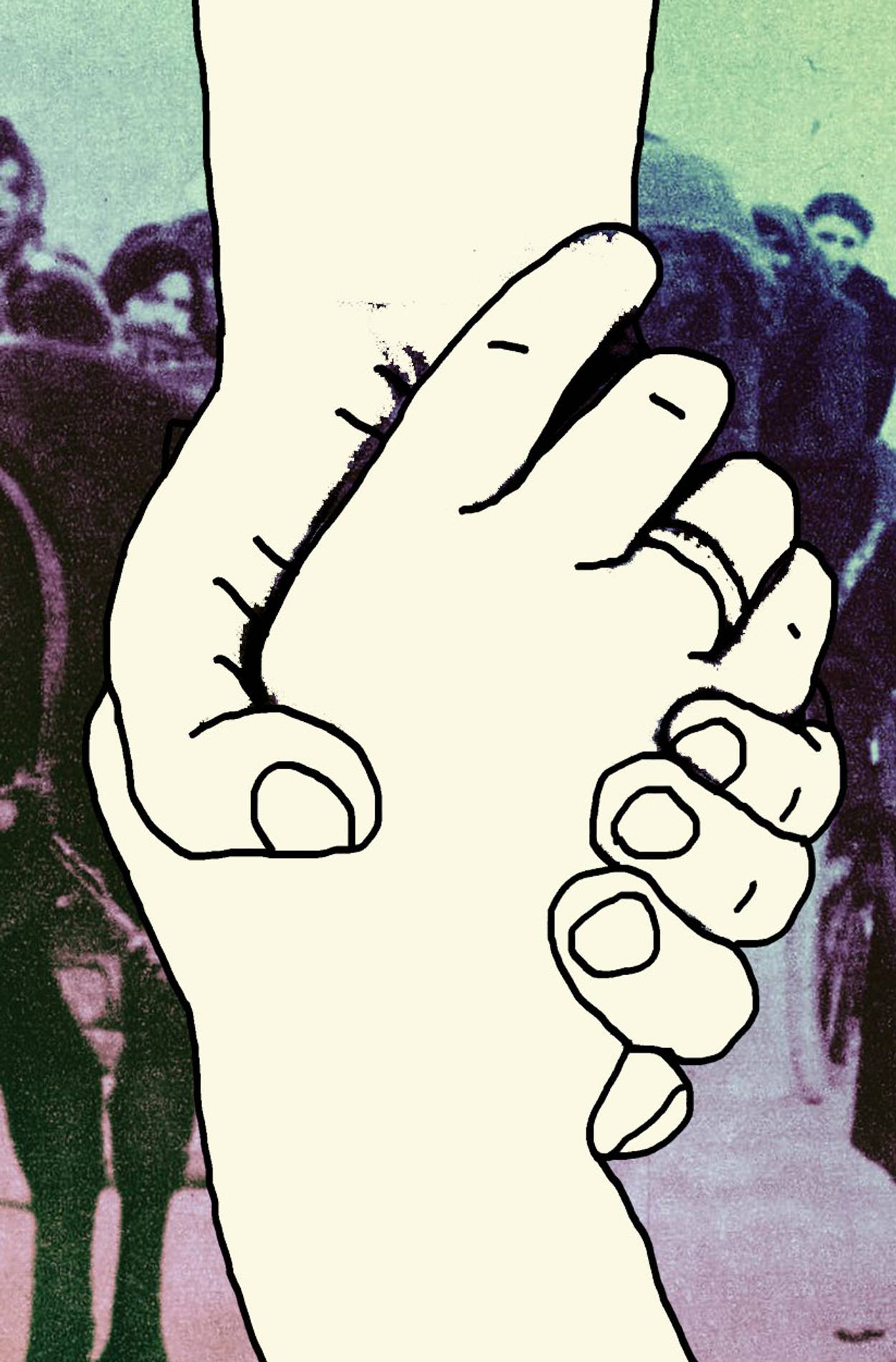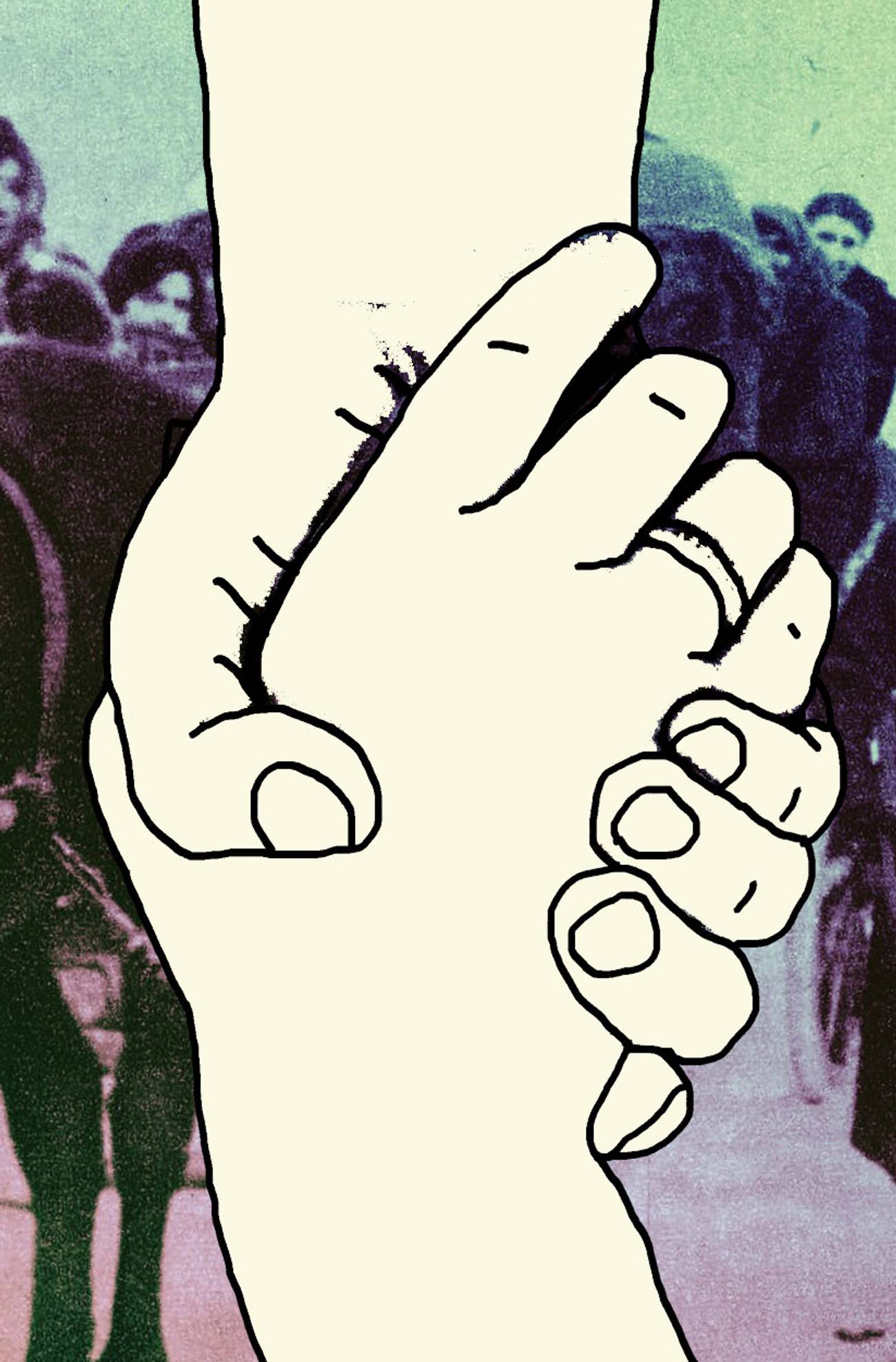A Tale for Two to Tell
How my husband’s family story of survival became my own




Over the 30-plus years of my marriage, I’ve come to understand that my husband Fred’s obsession with knowing every detail of WWII is his attempt to master the horrors of his parents’ experience as Holocaust survivors. Perhaps he believes that by learning yet another fact of history, he will find resolution, if not peace.
Recently, at dinner with friends, Fred told the story of his dad’s escape, as he frequently does. When he arrived at one particular moment, he got stuck, as he always does. I sat, waiting, spurring him on in my mind. But when I was certain that he was stalled, I jumped in to finish because it’s an account worth the telling—even if it requires two of us to carry it to the end.
In 1943, Fred’s father, Irving, along with other captured Jews, was sent to a forced labor camp in Romania. There they dug ditches, laid railroad tracks, and cleared forest land for roads.
“My dad told me that they were worked to exhaustion and many to their deaths,” Fred told our friends. “Food was scarce. My dad saw prisoners shot before his eyes. Conditions were harsh and death was all around them.”
He explained that the local guards in the camp were overseen by German superiors. Irving knew one of the guards, a gentile named Turot from his hometown of Sokirnitsa, a small village in what is now a part of western Ukraine. Turot’s father and Irving’s father knew each other through a business in which they cooperated in a government tree-cutting project.
One day, likely risking his own life, Turot said, “Irving, I won’t be seeing you anymore. Where you’re headed, I won’t be going.”
There was something in the guard’s tone and in his eyes that halted Irving in his tracks. He understood this to be an ominous warning from the son of a family acquaintance, meant to give him the chance to save his life.
Irving thought about Turot’s words all night, trying to decide what to do. The guards had warned prisoners that if anyone escaped, 10 prisoners would be killed. Irving considered that threat. Yet, he also noticed that roll call was no longer occurring and that some of the guards seemed indifferent and demoralized about prisoners missing. And, at the time, the Russian army air-dropped leaflets onto roads where the prisoners worked, encouraging them to step off the road and run to the forest. The leaflets told of the partisan groups operating in the forest, citizen soldiers fighting against the Germans, who would take them in.
By the next morning, Irving made the decision to escape. He told his friend Lazar, and asked Lazar to join him.
“I have a wife and daughter,” Lazar said. “What will they do without me if I get killed? I’ll have to think it over.”
That evening, as they staggered back to camp from another day of work, Irving seized his opportunity. Lazar walked next to him. They stared out at the black expanse of forest.
“Lazar, it’s time,” said Irving, his heart racing.
“I’ve decided to stay, Irving. God willing, I will live to see my family.”
Irving memorized his friend’s face, his sadness growing, and his resolve hardening.
“I’m going. Goodbye Lazar, and may God be with you,” said Irving.
He turned toward the forest.
At this point in the story, Fred was halted by his own tears.
When I was in psychiatric residency, I learned a theory about why we cry at happy endings. It’s about the economy of nature. Back when humans were hunters and had to run away from bears and tigers, our bodies didn’t react emotionally to the terror of the moment. We were in the fight-or-flight response. We used our energy to flee. There was no time for tears or fear or sadness. We were stuck in a life-and-death struggle. Only when we reached safety, higher ground, or the comfort of the pack could we let down and cry. So, when we cry at a happy ending, letting down our guard once we feel safe, our tears are for the tension, panic, and dread that preceded our arrival at safety.
When Fred stopped, I took over, finishing the story, as well as removing the spotlight from Fred and his tears.
I’ve thought a lot about why I always jump in to finish Fred’s story. Partly, I want to help my husband honor his father. I’ve watched Fred, over the years, take care of his parents. He told me that, even as a young child, he shouldered responsibilities for them. Because Yiddish was their first language, and young Fred learned English quickly, he was the one to haggle with health inspectors who checked the family bakery. He attended doctor’s appointments to interpret for his parents. I imagine my husband as that dutiful child. In psychiatric jargon we call this the parentified child, when the child assumes responsibility for the parents’ well-being, in a kind of child-parent role reversal. That quality of Fred’s needing to take charge makes his tearful breakdown even more poignant. So when he halts telling the story, I want to be there for him, at least to finish it. I am the supporter, the shock absorber, and rescuer. I’m the child spared.
That’s what drove me that night we sat with our friends.
I shared how Irving explained his final thoughts about escaping: “At that moment, as I faced the forest, I decided to place myself in God’s hands and I ran. I was prepared for the fate that God had in store for me.” Irving described a guard shooting at him but missing as he ran for the cover of the trees.
I imagined this as a moment of terror and of release, Irving running to freedom with the wings of God carrying him and protecting him from the guard’s bullets. As an observant Jew, Irving believed in God, in Judaism, and in the ancient traditions of his people. Perhaps, if he wasn’t so observant and if he’d been sent to the death camps, religion would have left him like it did for many. But Irving escaped with both his life and his belief intact.
I continued, thrilled by Irving’s run for freedom. I hoped that some of Irving’s faith would rub off on me as I told the story. I wanted to believe that God would be with me through troubled times, and that I, too, if it were warranted, would take the leap of faith that Irving took that night. But I am of a different mettle. Overall, I reserve my faith and trust for those I love and for science, rather than for the spiritual. I don’t know if I would have taken off like that, risking being shot by the guards while trying to save myself. I might have been stuck in helpless captivity, believing that if I followed the rules, I would be safe, a foolish premise given the Nazis’ evil agenda for the Jews. If I had run, I would have felt alone, not in God’s hands. But, as I continue, in my mind, I fly along with Irving, transcending self-doubt, sharing in Irving’s belief that God would be with me. I understand that faith in God was Irving’s weapon that night, as well as his solace in the days that followed.
“Irving wandered alone for three days in the forest,” I explained. “Finally, a man with a wagon found him, hungry and weak, but alive. The man, a local farmer, gathered him up and took him to a group of partisans.”
Irving was transformed from victim to resister and fighter. I felt his triumph. I looked to Fred to see if he wanted to finish the story of his father, but he waved me on to continue.
I told them that Irving and other partisans, directed and armed by the Russian army, liberated Sokirnitsa, Irving’s hometown. For him, the war ended there.
Our friends wanted to know about Lazar.
“Lazar was never seen again,” I said. “Likely he didn’t survive. Likely his wife and child didn’t survive.”
I contemplated the human capacity for evil, the dark truth underlying this story. But to surmount such evil makes Irving’s survival even more inspiring, and I took pleasure in his victory as though he were my own father. I told how Irving and Sarah met up after the war, how they married and found their way to a displaced persons camp in Germany where Fred was born. How the family moved to America, had two more sons, and ran a family bakery.
I finished, landing the tale by describing Irving’s and Sarah’s success: their children, grandchildren, their bakery business, and their religious practice. Memories continued to haunt them. They mourned lost relatives. Sarah rarely spoke about her experiences in the camps. When she did, she kept her comments short. Irving waited until he was well into his 90s to unpack and share his traumas with his family. They lived with deep scars. But they valued their lives, thankful to have survived such suffering.
At the end, I was satisfied that I’d done justice to the story. I glanced over at Fred and saw him slouched in his chair. He appeared spent. I understood that Fred had struggled to recount and to listen to his father’s story, again. He offered me a look of gratitude for finishing. I smiled. And then, a realization hit me: It doesn’t matter that this isn’t my particular family history. In the manner of long-term marriages, Fred’s story has become mine. It takes the two of us to bear witness to its truths, and in the telling we share its weight.
Sherry Mendelson is a writer and psychiatrist living in the Los Angeles area with her family.